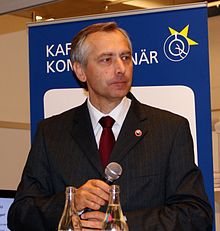Ján Figeľ
| Ján Figeľ | |
|---|---|
 |
|
| European Commissioner for Education, Training, Culture and Youth | |
|
In office 1 January 2007 – 1 October 2009 |
|
| President | José Manuel Barroso |
| Preceded by | Himself (Education, Training, Culture and Multilingualism) |
| Succeeded by | Maroš Šefčovič |
| European Commissioner for Education, Training, Culture and Multilingualism | |
|
In office 22 November 2004 – 1 January 2007 |
|
| President | José Manuel Barroso |
| Preceded by |
Viviane Reding Dalia Grybauskaitė (Education and Culture) |
| Succeeded by | Himself (Education, Training, Culture and Youth) Leonard Orban (Multilingualism) |
| European Commissioner for Enterprise and Information Society | |
|
In office 1 May 2004 – 22 November 2004 Served with Erkki Liikanen, Olli Rehn |
|
| President | Romano Prodi |
| Preceded by | Erkki Liikanen |
| Succeeded by |
Günter Verheugen (Enterprise and Industry) Viviane Reding (Information Society and Media) |
| Personal details | |
| Born |
20 January 1960 Čaklov, Czechoslovakia (now Slovakia) |
| Political party | Christian Democratic Movement |
| Spouse(s) | Mária Figeľová |
| Children | 4 |
| Alma mater | Technical University of Košice |
| Religion | Roman Catholicism |
Ján Figeľ (born 20 January 1960) is a Slovak politician who was European Commissioner for Education, Training & Culture from 2004 to 2009. His area of responsibility also covered sport, youth, and relations with civil society.
Born in Čaklov, Figeľ studied power electronics at the Technical University of Košice for five years, beginning in 1978. From 1983 he worked as a research and development scientist for ZPA Prešov. He joined the conservative Christian Democratic Movement (KDH) in 1990 and was elected to the National Council of the Slovak Republic in 1992, serving on its Foreign Affairs Committee and becoming a member of Slovakia's delegation to the Council of Europe a year later.
In 1998 Figeľ left his parliamentary seat and was appointed State Secretary of the Ministry of Foreign Affairs. Unlike most of his colleagues in the European Commission, he never rose to a cabinet-level position, but led Slovakia's accession negotiations with the European Union until 2003. He also represented the Slovak government in the European Convention which drafted the European Constitution. He returned to the National Council in 2002 where he chaired its Foreign Affairs Committee, stepping down in 2004 to take up his Commission post.
From 1995 to 2000 Figeľ lectured in international relations at Trnava University. He is married with four children.
...
Wikipedia
